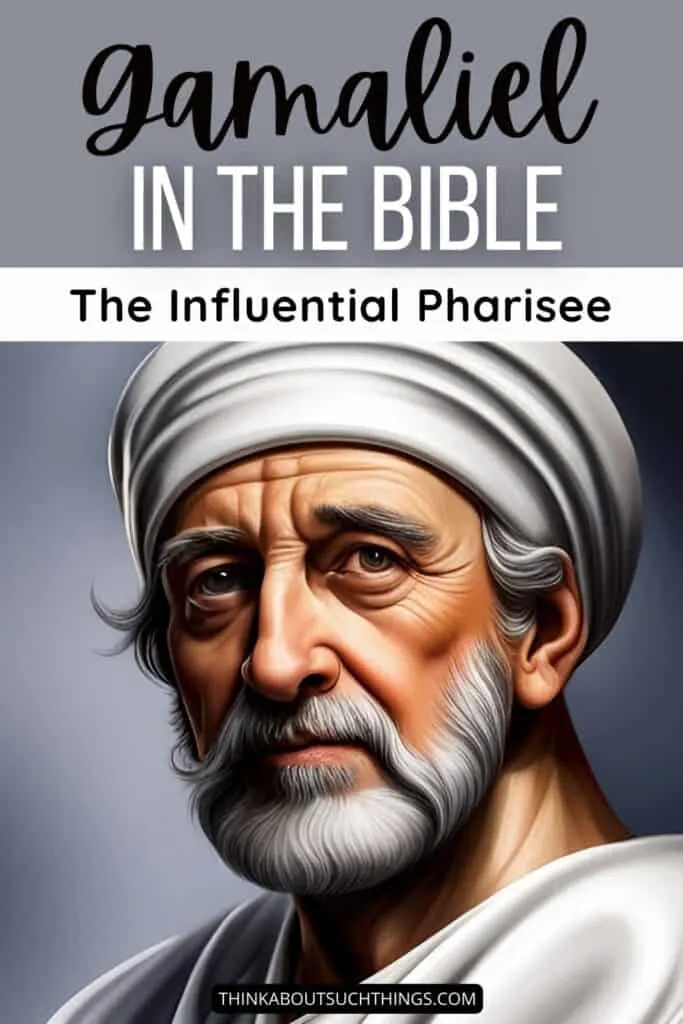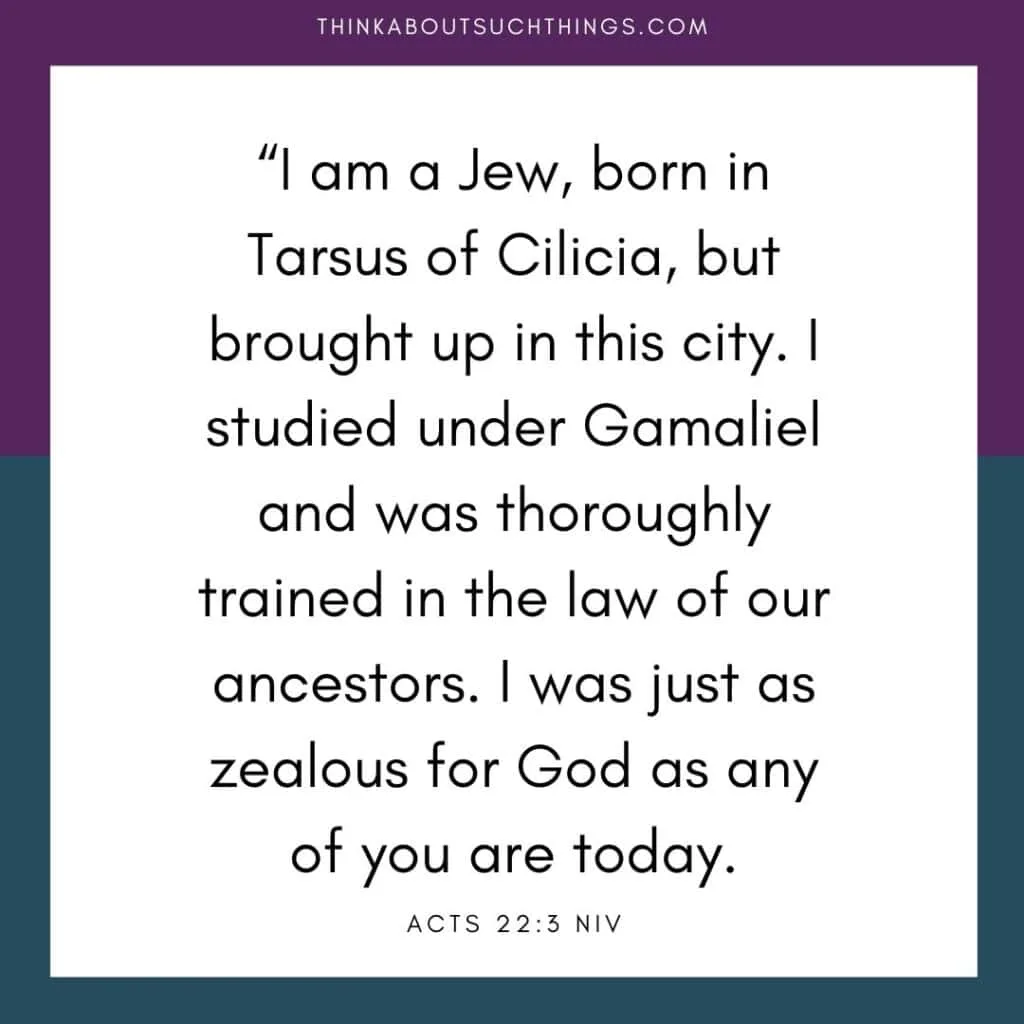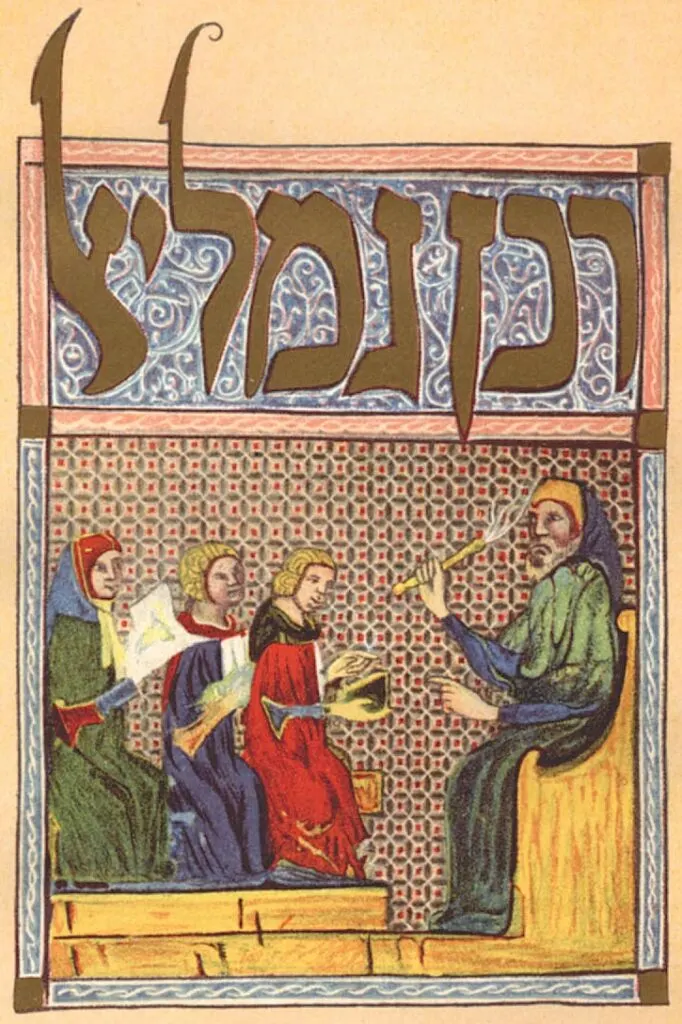In this article, we will learn about Gamaliel in the Bible. And how this Pharisee had such a huge impact on Christianity. So, grab your Bible, and let’s dive in…
Have you ever heard of Gamaliel?
He’s not a big key figure in the New Testament like the Apostles, but he left an impact on Christianity.
Gamaliel, a respected member of the Sanhedrin, the highest court of justice and the supreme council in ancient Jerusalem is most notably mentioned in the Book of Acts.
His role was pivotal during those transformative years after Christ’s resurrection when the Christian movement stirred hope and controversy within Jewish society.
Known as a voice of reason amidst turbulent times, Gamaliel’s teachings and decisions shaped the religious landscape of his era and offered timeless lessons for Christians today!
His famous advice to the Sanhedrin to refrain from persecuting the apostles…
if their purpose or activity is of human origin, it will fail. But if it is from God, you will not be able to stop these men; you will only find yourselves fighting against God. – Acts 5:38-39
This small statement has forever changed the course of the gospel being spread throughout the world! Alright, let’s start learning more about this Pharisee.

Who Was Gamaliel In The Bible?
Gamaliel was a highly respected teacher (Rabbi) of the Sanhedrin, the Supreme Jewish Council in Jerusalem. He was a Pharisee, a sect of Judaism known for its strict adherence to traditional customs.
Gamaliel was renowned and respected for his extensive knowledge of Jewish laws and customs during the early days of Christianity.
Gamaliel was more lenient with the Old Testament laws than his grandfather, the famous Jewish scholar Rabbi Hillel, who held a more stringent perspective on Jewish customs and traditions.
One of Gamaliel’s scholars was Saul of Tarsus before he converted and changed his name to Paul the Apostle! That’s a pretty big deal, as you are probably familiar with all the works of Paul. (Acts 22:3).
“I am indeed a Jew, born in Tarsus of Cilicia, but brought up in this city at the feet of Gamaliel, taught according to the strictness of our fathers’ law, and was zealous toward God as you all are today. – Acts 22:3 NKJ

The Story of Gamaliel In The Bible: The Gamaliel Principle
In the book of Acts, we read how Gamaliel intervened and defended Peter and the Apostles when the Jewish Council wanted them killed. The Sanhedrin had commanded the Apostles not to preach about Jesus.
But they did not pay any attention, continued preaching, and even performed miracles in the name of Jesus. I love how it even states that they preached with boldness. Nothing was holding them back!
And because of that, the early Christian church thrived under the teachings of these Apostles.
The High Priest, as well as a group of Jews, were upset about this situation and called the Sadducees to intervene.
They were wealthy merchants and members of royalty and nobility. They sent the Apostles to prison, but during the night, God sent an Angel to set them free and commanded them to preach in the temple (Acts 5:19).
The High Priest was livid when he was made aware of this, and that is when he planned to kill the Apostles.
Relying on his reputation and esteemed authority, Gamaliel approached the Sanhedrin and, knowing his words held weight among the council members, changed the dire outlook for the Apostles.

Using his knowledge of the law, he discreetly excluded the Apostles from the discussion, showing respect for the Council and enhancing his credibility.
Wisely, Gamaliel offered advice, warning of the potential dangers and emphasizing that opposing God would lead to failure as they could not fight God.
He urged the Council to reconsider its decision. He reminded them of previous uprisings led by various leaders that eventually fell and became nothing.
Gamaliel’s advice was to let the Apostles continue and that this movement might also fade away if it was not from God.
Ultimately, his persuasive abilities prevailed, as the Council agreed to spare the Apostles’ lives. Still, they would have to endure physical punishment.
This is such an amazing story of God using Gamaliel with a word of Wisdom, it also shows you the heart of Gamaliel to be careful with the things of God and to value life.
Historical Facts About Gamaliel

In the late first century (A.D 22-55), Gamaliel was a leading figure in the highest court of Jerusalem. As a member of this court, he became known as a “Ha-Zaken,” which means Elder.
Not much is known about Gamaliel’s family, only that his father’s name was Simon. It was quite common for Pharisees to be married, but we have no historical information on that it is recorded that he had two children, a son named Simeon and a daughter.
Gamaliel was held in the highest esteem as a teacher of the Law. He was among the first teachers to be given the title “Rabban” (our Master/teacher), a title higher than a Rabbi.
He was also given the title “Nasi,” which in Hebrew means prince.
The only facts that are known about his public teaching are recorded in the Book of Acts, where it is written that the Apostle Paul was taught by Gamaliel.
Paul was known for his extensive knowledge of the law, a testament to the teaching and mentorship of this great teacher. Scripture tells us that whichever place Paul visited, his comprehensive education allowed him to preach in the synagogues.

According to Jewish history, a statement claims that Gamaliel classified his pupils, comparing them to classes of fish. These were:
- Students from impoverished parents who acquired knowledge through memorization but lacked understanding were like “unclean fish.”
- Pupils who learned and understood everything and were from affluent parents were the “clean fish.”
- Students that were like fish from the River Jordan were those that acquired knowledge but struggled to provide appropriate responses.
- Pupils classed as fish from the Mediterranean Sea learned everything and knew how to respond when asked questions.
Gamaliel advocated for a more lenient and less burdensome approach to the observance of the Sabbath. He sought the protection of women by aligning with prevailing customs regarding divorce and encouraged a compassionate attitude towards Gentiles.
As an academic scholar with a remarkable intellect, he enthusiastically studied Greek literature.
According to Rabbinic literature, it is mentioned that Gamaliel sent out three epistles (letters) notifying the Jewish councils of new religious rulings. This act portrays Gamaliel as the head of the Jewish Council for religious law.
Following his passing, the respect and devotion for the law diminished, which resulted in the decline of purity and virtue.
Gamaliel’s body was discovered in the 5th century and was taken to the Pisa Cathedral in Tuscany, Italy.
This building is considered sacred by the Catholic Church. The Eastern Orthodox Catholic Church had venerated Gamaliel as a Saint, and his life is commemorated on August 2nd when his body was found.
Was Gamaliel A Christian?
Some literature suggests that Gamaliel converted to Christianity but kept it a secret and remained a member of the Sanhedrin to help his Christian friends.
This thought was also prompted by his tolerant attitude toward Christians. But this is not a stated fact, and it cannot be said that he did or did not become a Christian.
What we do know is that God used him to move the gospel forward!
Why Was Gamaliel Important?
One of Gamaliel’s most significant contributions was his role in preventing the immediate prosecution of the early Christians.
By convincing the Sanhedrin not to persecute them, he played a crucial role in protecting the freedom of the Christian movement. His actions allowed them to continue spreading their message.
Gamaliel’s impressive ancestry and association with his grandfather Hillel the Elder added to his prestige and gave him a solid intellectual foundation.
This enhanced his credibility and reputation among the Jewish community.
Historically, we may not know much about Gamaliel, but the New Testament, where he is mentioned, provides valuable insights into religious and political power dynamics during this era.
His moderation, tolerance, and consideration of alternative viewpoints exemplify how wisdom and discernment can contribute to maintaining peace and stability within a community.
Gamaliel’s importance lies in his respected teacher role, influential position within the Sanhedrin, and counsel regarding the early Christian movement.
His wisdom and actions continue to inspire discussions of religious tolerance, intellectual dialogue, and religious dynamics within various historical and theological contexts.
Although Paul did not receive an education in Christianity from Gamaliel, he was educated strictly according to the law. This education equipped Paul to present clear disputes within the Jewish community based on his knowledge of the law he received before the arrival of Jesus.
It reminds me a lot of how Moses was raised in Pharaoh’s house. Sometimes, God places us in areas of learning that don’t make sense, but in the long run, they play a huge role.
Even if Gamaliel never converted to Christianity, he recognized the power of God. He knew that no one could stand in the way of God’s plans or try to contest the Gospel and the spreading of His word.
To recap on what we have learned today!
Gamaliel was a respected member of the High Council of Jerusalem (Sanhedrin) and was known for his extensive knowledge of Jewish laws and customs.
However, he was more lenient regarding the Old Testament laws, and he showed more tolerance and compassion towards the early Christians of that era.
A testament to his acceptance of early Christians was when he advised the Sanhedrin not to kill the Apostles because no one could fight against God. One of his students was Saul of Tarsus, later known as the Apostle Paul.
Although Gamaliel did not teach Paul about Christianity, he shared his extensive knowledge of Jewish laws. Paul used these learnings throughout his travels when he preached in the synagogues.
I hope you have enjoyed this article and that you have learned something new! Feel free to leave me comment below if you like!

Melissa is a passionate minister, speaker and an ongoing learner of the Bible. She has been involved in church and vocational ministry for over 18 years. And is the founder of Think About Such Things. She has the heart to equip the saints by helping them get into the Word of God and fall more in love with Jesus. She also enjoys family, cooking, and reading.
She has spoken in churches in California, Oregon, Texas, and Mexico and has been featured in Guidepost Magazine and All Recipes Magazine. Read More…
